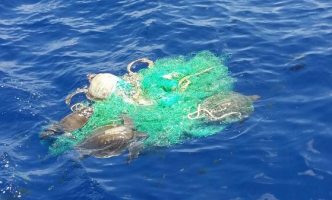New plastic neutrality project presents Maldivian fishers as a remarkable solution to ocean pollution.
The net retrieval and turtle release project which saw the International Pole and Line Foundation partner with the Olive Ridley Project, utilised the unique position of Maldivian one-by-one fishers to help clean up the oceans. The project began in 2021 when IPNLF was awarded the World Animal Protection’s first annual Joanna Toole Ghost Gear Solutions Award and concluded recently after demonstrating great success. Today, we’re incredibly proud to share our end-of-project video and article with you.

We collaborated with 12 tuna vessels from Gemanafushi Island in the Maldives to implement a ‘ghost gear’ collection and turtle release programme which incentivised coastal fisheries to collect and upcycle lost and abandoned ghost nets they encountered whilst fishing.
In the world’s ocean today, marine wildlife face a constant existential threat. Due, in part, to a lack of regulation, commercial fishing vessels lose or abandon between 500,000 and 1 million tons of fishing gear each year. It is estimated that such fishing gear makes up 10% of ocean plastics, and up to 86% of large floating plastics in areas such as the Great Pacific Garbage Patch. Known as “ghost gear”, discarded nets, drifting Fish Aggregating Devices (FADs) and other fishing equipment, drift aimlessly at sea unless otherwise removed.
By the end of the project, these one-by-one tuna fishers from 12 small vessels in Gemanafushi Island had collected enough ghost nets to offset the total weight of all gear loss contributions of half of the national Maldivian fleet (almost 350 Maldivian vessels). These achievements demonstrate the scale of the impact that can be had by a small fraction of fishers!
The Maldives is well-known for being an ocean sanctuary with a diverse array of marine life and the area is particularly unique as commercial net fishing is illegal in their waters. Instead, the national fishing fleet only uses environmentally sustainable pole-and-line and handline fishing methods. However, ghost nets are becoming an increasing threat to wildlife here due to rampant net fishing elsewhere in the Indian Ocean. Ghost nets and drifting FADs abandoned by vessels operating elsewhere in the Indian Ocean drift into Maldivian waters killing marine species, like turtles and sharks, and damaging critical habitats, like coral reefs and seagrass beds.
Perhaps the greatest legacy of IPNLF’s ghost gear project is in establishing a replicable model which enables local fishing communities all over the world to remove ghost gear from the ocean at a greater rate than is lost through their own fishing operations, therefore becoming plastic neutral. In the coming months we are looking for partners and collaborators to join us on these projects and help us to find new ways of recycling and upcycling collected ghost nets.

About IPNLF
The International Pole and Line Foundation (IPNLF) is the only organisation in the world solely committed to supporting, developing and promoting the world’s pole-and-line, handline, and troll (collectively known as “one-by-one”) tuna fisheries. (PNLF was officially registered as a charity in the United Kingdom in 2012 (Charity no. 1145586), with branch offices in the United Kingdom, The Netherlands, the Maldives, South Africa and Indonesia. IPNLF have since led global efforts to support, develop and promote the world’s responsible pole-and-line, handline and troll (collectively known as ‘one-by-one’) tuna fisheries. Our mission is to empower responsible fisheries that give back to the seas and the people that depend on them, and our vision is a world with thriving fisheries that work in balance with nature by catching one fish at a time.
Allied with our members, we empower responsible fisheries by providing on-the-ground support, advancing public policy advocacy initiatives, and educating consumers of the benefits of buying environmentally sustainable and socially responsible tuna products. Our members are based around the world, and include fisheries, processors, distributors, brands, food services and retailers. Through these partnerships, we drive fisheries improvements in line with the SDGs, enable and promote responsible tuna sourcing, and elevate the market recognition of one-by-one tuna fisheries. Our growing membership base is a testament to the increased demand by consumers for responsibly sourced seafood, as well as IPNLF’s role in connecting responsible supply chain actors throughout the one-by-one tuna community.
This piece was prepared online by Panuruji Kenta, Publisher, SEVENSEAS Media

